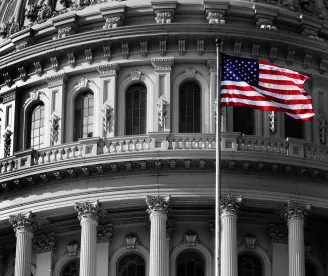The newly enacted $1.9 trillion American Rescue Plan Act of 2021 (the “Act”) includes broad financial relief in a variety of categories but actually has less impact on employers than previously was anticipated.
The Act is notable for what is not included in the final law signed by President Biden on March 11, 2021. Specifically, two employment issues that had generated much publicity and debate in earlier iterations of the legislation were not included in the enacted law: the federal $15 per hour minimum wage, and mandatory extension of the federal Families First Coronavirus Response Act (“FFCRA”).
The Act does, however, include a number of key provisions impacting employers, including the following:
-
Unemployment Insurance. The Act extends the federal pandemic payment of $300 in extra weekly unemployment insurance benefits through September 6, 2021. It also extends benefit coverage for gig workers and the self-employed. In addition, the Act provides that the first $10,200 of unemployment insurance received in 2020 will be federal tax-free in 2021 for workers with household incomes of less than $150,000 per year.
-
FFCRA Modifications. While the Act did not extend mandatory leave, which had expired on December 31, 2020, it contains a number of significant FFCRA amendments. The Act:
-
continues to allow employers with fewer than 500 employees to voluntarily provide leave for certain COVID-related reasons.
-
extends the tax credits available for employers who voluntarily provide FFCRA leave from March 31, 2021 to September 30, 2021.
-
provides that in addition to the existing reasons for leave set forth in the FFCRA, employers also will receive tax credits for providing paid leave to employees who are:
-
obtaining an immunization related to COVID-19; or
-
recovering from any injury, disability, illness or condition related to such immunization; or
-
seeking or awaiting the results of a diagnostic test or medical diagnosis for COVID-19 when the employee has been exposed to COVID-19 or the employer has requested such a test or diagnosis.
-
-
resets the clock on 80 hours of emergency paid sick leave and tax credits available to the employer, commencing April 1, 2021, which means that employers may grant a new bank of 80 hours to employees even if they have used this time previously.
-
eliminates the prior two week waiting period for expanded family and medical leave (if the employee is unable to work or telework due to COVID-19 related unavailability of a child’s school or childcare) and increases the tax credits available to employers from $10,000 to $12,000 to cover a leave of up to 12 weeks at two-thirds the employee’s regular rate up to $200 per day.
-
includes non-discrimination rules to provide that no tax credit is available if the employer discriminates with respect to leave (i) in favor of highly compensated employees, (ii) in favor of full-time employees, or (iii) on the basis of tenure with the employer. Thus, employers that elect to provide such leave to employees should do so uniformly, without discriminating against certain categories of workers.
-
-
COBRA Subsidies. The Act includes coverage of 100% of the cost of continuing health insurance for up to 6 months under COBRA during the period of April 1, 2021 through September 30, 2021, where an employee has lost coverage under their employer’s health care plan due to a layoff or involuntary termination. As a result, this would allow employees who were laid off in or after March 2020 to be able to take advantage of the subsidy if they are still receiving benefits under COBRA during this period. The Act also creates a special election period for any individual who did not elect federal COBRA continuation coverage but who otherwise would have been eligible for the COBRA subsidy and for any individual who elected federal COBRA continuation coverage and discontinued such coverage before April 1, 2021. The Act directs the U.S. Department of Labor (DOL) and Internal Revenue Service (IRS) to issue regulations and guidance regarding the application and administration of the COBRA subsidy provisions, and the DOL to produce model COBRA election notices.
-
Paycheck Protection Program. The Act adds an additional $7.25 billion of funding to last year’s Paycheck Protection Program, which provided for fully forgivable loans for certain qualified employers, provided they have maintained certain levels of payroll and headcount.
-
Restaurant/Shuttered Venue Relief. Industry-specific relief is also included in the package with funds set aside for the restaurant and food service industry and for shuttered venue operators (such as theatres, live performing arts organizations, and museums).
Takeaways:
Just as the onset of the pandemic created a flurry of complicated and often conflicting rules, the loosening of restrictions will result in further complex issues. Employers should remain vigilant for further developments, including evolving federal, state and local guidance on protocols for vaccinated individuals, quarantines and workplace protocols. Please contact us if you have any questions about these issues.




 />i
/>i

